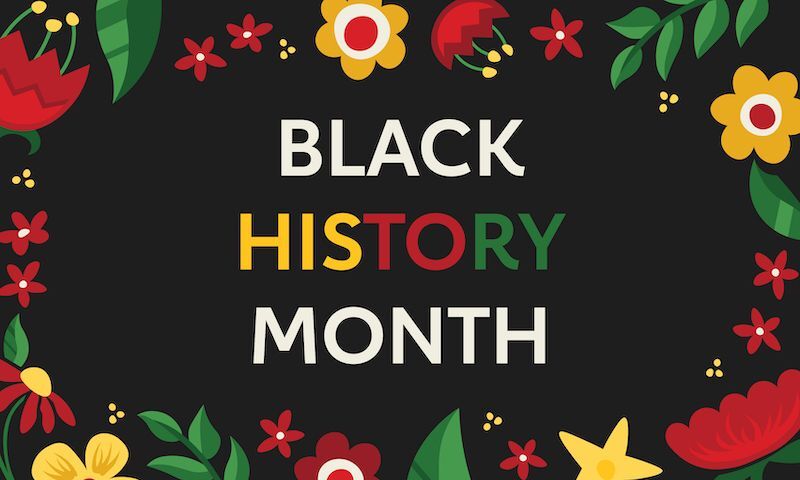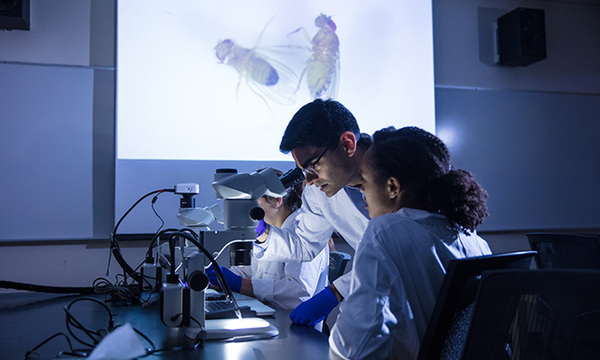OVERVIEW
As part of our efforts to live out our shared biblical value of unity amidst diversity and to highlight and show appreciation for our brothers and sisters from diverse backgrounds, we will host Cultural Heritage Month celebrations throughout the year.
Biola celebrates Black History Month by recognizing the experiences, beauty and strength of members in the Black community.
Throughout February, Biola will be hosting a variety of events on campus, including our annual gospel fest and speakers in chapel. In addition, we’ll be sharing music, history and individual stories across our social media and information available on this page.
We take this opportunity to listen, learn and reflect on the cultural heritage and contributions of Black Americans. Through this practice, we grow and build a community within the body of Christ at Biola University. As Psalms 133:1 states, “How wonderful it is, how pleasant, for God’s people to live together in harmony!”
INFLUENTIAL FIGURES
Black History Month allows us to learn more about some of history’s significant visionaries, leaders and changemakers. In overcoming challenges, many looked to God’s word for comfort and hope, developing resilience in order to make positive changes.
The list below is meant to provide a glimpse into the rich diversity of the excellence and accomplishments of the Black community. We encourage you to share who you find inspirational on your social media pages by tagging #BUBlackHistoryMonth.
"For just as each of us has one body with many members, and these members do not all have the same function, So in Christ we, though many, form one body, and each member belongs to all the others. We have different gifts, according to the grace given to each of us.” Romans 12:4-5
The views represented in the links below may be from non-Christian sources and may not fully reflect the views of Biola University.
Art
Augusta Savage (1892-1962) was a sculptor who contributed to the Harlem Renaissance, a groundbreaking movement in 1918 in New York City. She co-founded the Harlem Artists Guild and the Harlem Community Art Center. She also became the first Black member of the National Association of Women Painters and Sculptors.
Jacob Lawrence (1917-2000), at just 23 years old, completed his “Migration Series”, a 60-panel series of colorful paintings about the mass exodus of over 6 million Black fleeing the segregated South. He received numerous accolades including the U.S. National Medal of Arts.
Read more: 10 Groundbreaking African American Artists That Shaped History (MyModernMet.com)
Athletics
Althea Gibson (1927-2003) was the first African American to compete in the U.S. National Championships, the precursor to the U.S. Open. Tennis was a segregated sport but her skill and strength broke the color barrier in the 1950s. In 1957, she was the first Black champion in the 80-year history of Wimbledon. In her career, she won 11 Grand Slam titles and was the world’s top-ranked female player. She then took up golf and was the first Black player on the LPGA tour.
Bill Russell (1956-1969) is considered one of the best basketball players of all time. He played center for the Boston Celtics who won 11 NBA championships in his 13-year career. He later became the first Black head coach in NBA history and professional sports.
Read more: 25 Black Athletes Who Changed the World (Complex.com)
Business
Madame C.J. Walker (1867-1919) is the first female self-made millionaire in America. She was a talented entrepreneur who made her fortune by developing and marketing a line of cosmetics and hair care products for Black women.
Robert F. Smith (b. 1962) is the founder of and CEO of Vista Equity Partners, the fourth largest enterprise software company. In 2019, he pledged to pay off the student loans of an entire graduating class at Morehouse College.
Read More: Black In Business: Celebrating The Legacy Of Black Entrepreneurship (Forbes.com)
Civil Rights Leaders
Josephine St. Pierre Ruffin (1842-1924) was the founder and editor of Women’s Era, the first newspaper written for and by Black women, and she was devoted to the Women’s Club Movement and Women’s Era Club, which helped to lead to the formation of the National Association for the Advancement of Colored People (NAACP) in 1909.
John M. Perkins (b. 1930) is one of the leading evangelical voices to come out of the civil rights movement. He is an internally known author, speaker and teacher on issues of racial reconciliation and Christian community development living in California.
Learn More (Video): 7 Civil Rights Leaders You Need to Know (History.com)
Medicine
Daniel Hale Williams (1856–1931) was a general surgeon who performed the first successful open heart surgery in 1893. He also founded Provident Hospital, the first non-segregated hospital in the United States as well as an associated nursing school for Black medical professionals.
Kizzmekia S. Corbett, Ph.D. (b. 1986) is a modern viral immunologist who was one of the leading scientists to develop the Moderna COVID-19 vaccine, working with the Vaccine Research Center since 2014.
Read more: 12 Black American Pioneers Who Changed Healthcare (EveryDayHealth.com)
Music
Mahalia Jackson (1911–1972) was a 20th-century recording artist known as the Queen of Gospel. She worked with artists like Duke Ellington and Thomas A. Dorsey and also sang at the 1963 March on Washington at the request of Dr. Martin Luther King Jr. Jackson is remembered and loved for her impassioned delivery, her deep commitment to spirituality and her lasting inspiration to listeners of all faiths.
Gerald Wilson (1918-2014) was a trumpeter, arranger, composer and major innovator in jazz music. His arrangements influenced many musicians that came after him. He appeared at the 1963 Monterey Jazz Festival.
Read More: Celebrate Black History Month by remembering these influential musicians (VoxMagazine.com)
Theology
Lemuel Haynes (1753-1833) was a Revolutionary War-era pastor, remembered as the first Black man ordained as a preacher in the United States, where he led mostly White congregations in New England during his 40-year ministry career.
Mitzi Smith became the first Black woman to earn her doctorate in New Testament from Harvard University in 2006. Since then she has taught and written about the New Testament and early Christianity at Ashland Theological Seminary and Columbia Theological Seminary.
RESOURCES
Consider learning more about an area of Black history you aren’t familiar with yet. Below are several recommended podcast episodes, films, movies, books, articles and museums to explore and research further. We’ve also provided a list of groups to join on campus. By opening our hearts and eyes to see and understand what we don’t already know, we can grow in our ability to serve, love and understand one another and live out God’s vision of unity.
Biola Library
Learn more about the African American experience in the United States by browsing relevant library databases (https://libguides.biola.edu/africanamericanhistorymonth) and searching the Library's multi-disciplinary collection (www.biola.edu/library). Visit the Library display on the main floor to view a sample of relevant Library resources.
Podcasts/Talks to Listen to
Black History Month podcast series from the Academy of Achievement
BECK Podcast for a Diverse America - Biola faculty member Dr. Denise Reid speaks about Disability as a Diversity Identity
The Danger of a Single Story TED Talk by Chimamanda Ngozi Adichie
We Need to Talk About Injustice TED Talk by Bryan Stevenson
Films to Watch
Harriet (Hulu, Amazon Prime, HBOMax), is a 2019 film about the historic abolitionist Harriet Tubman, who led hundreds of slaves to freedom through the Underground Railroad.
Hidden Figures (Hulu, Disney+), is a 2016 film about three African-American women at NASA who were the brains behind the launch of astronaut John Glen into orbit.
Red Tails (Disney+) is a 2012 war film about the 13 Tuskegee Airmen who became fighter pilots during World War II.
Ruby Bridges (Disney+) is a 1998 film about the true story of 6-year-old Ruby Bridges, who was the first African American to integrate her local elementary school after Brown vs. Board of Education
Summer of Soul (Hulu, Disney+) is a 2021 documentary about the Harlem Cultural Festival that took place during the summer of 1969, where thousands of people attended to celebrate Black history, culture, music and fashion.
Museums to Visit
California African American Museum, located in Los Angeles, was the first African American museum of art, history, and culture fully supported by a state. It houses a permanent collection of 5,000 objects and artworks from the African diaspora and African Americans.
Mayme A. Clayton Library & Museum, located in Culver City, contains over two million rare books, films, documents, photographs, artifacts, and works of art related to the history and culture of African Americans in the United States.
African American Firefighter Museum, located in a historic Fire Station No. 30 in South Los Angeles, collects, conserves and shares the heritage of pioneering African Americans in the fire service.
Books and Articles to Read
Reading While Black: African American Biblical Interpretation as an Exercise in Hope, a book by Dr. Esau McCaulley
Soul Care in African-American Practice by Barbara Peacock
Start a Plan for Black History Month by YouVersion (Bible App)
“Creation Gives Hope for Justice” - The Front Porch, a Black-owned blog that speaks on biblical faithfulness in the African-American church and beyond
“Black Joy and Co-Crucifixion with Christ” article by Jarvis Wiliams, The Witness BCC
Little Legends: Exceptional Men in Black History (Children’s book by Vashti Harrison)
Sulwe (Children’s book by Lupit Nyong’o)
Groups to Join on Campus
Biola Student Clubs and Affinity Groups meet regularly throughout the semester. Please email the contact listed or view their page on the Biola App for more information on how to get involved.
Black Student Association (BSA) - The Black Student Association seeks to reflect the Kingdom of God by unifying students of all backgrounds in Christ-like love. We seek to foster a safe haven for Black/Multicultural/Pan-African students at Biola University. Contact bsa.club@biola.edu
Black African Student Association (BASA) - Our mission is to create a safe and open space for African and Caribbean students in the diaspora to meet, share their experiences and culture, while also empowering each other and enriching the Biola community. Contact basa.club@biola.edu
Chocolate Chat - An affinity group for Black/African American women to intentionally gather, be mentored and learn about shared experiences in their ethnicity/culture. Contact chocolatechat@biola.edu, Instagram: @chocolate_chat
Iron Sharpens Iron - An affinity group that gathers together to uplift, encourage, and equip Black men who seek Christ. Contact ironsharpensiron@biola.edu, Instagram: @ironsharpensironbiola
Fusion - A co-ed affinity group that exists to create a space for multiracial and multicultural individuals to embrace their identity with peers that share similar experiences. Contact fusion@biola.edu, Instagram @fusionseid
Learn more about SEID’s eight affinity groups.
View more resources from the Office of Diversity and Inclusion.
 Biola University
Biola University

.jpg)
.jpg)
